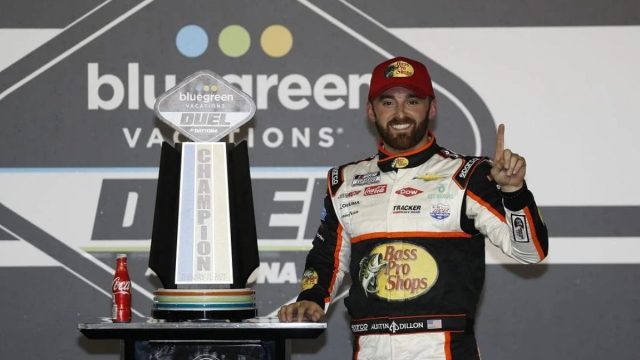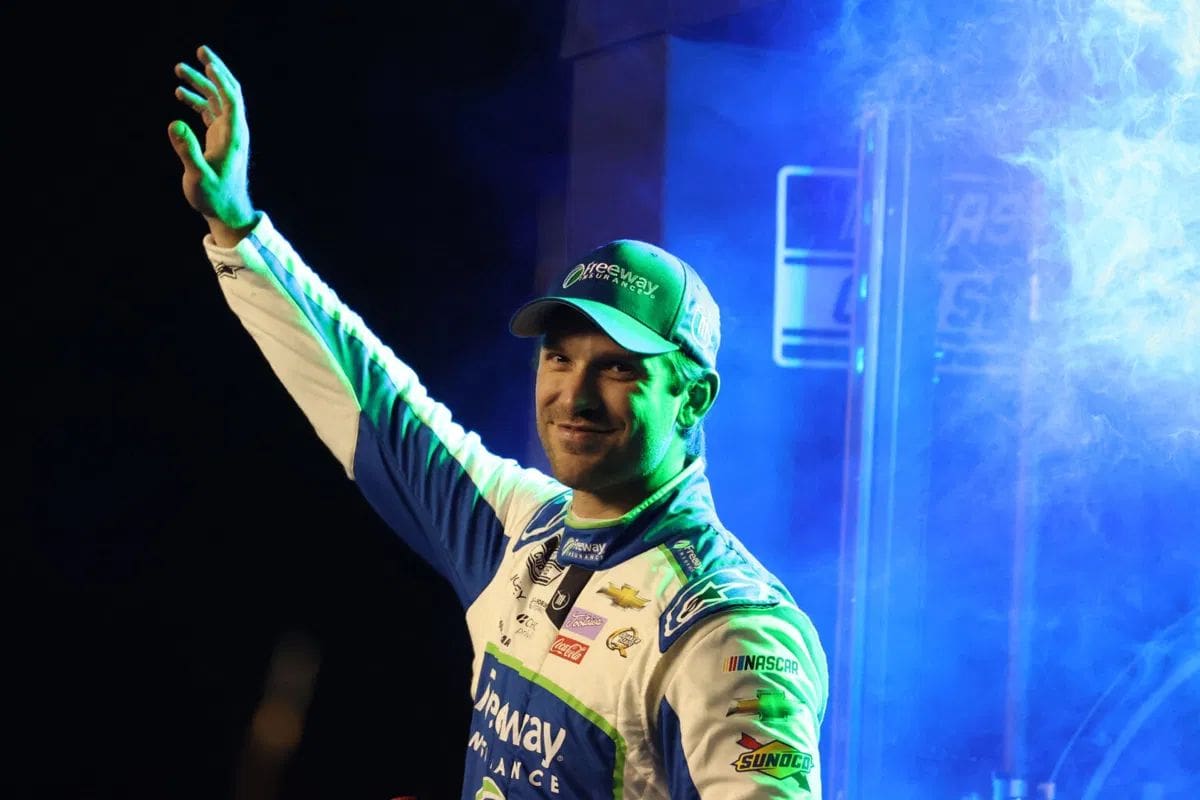Austin Dillon Wins Cook Out 400: Austin Dillon‘s recent victory at the Cook Out 400 has ignited a fervent discussion within the NASCAR community, not merely for the win itself but for the contentious circumstances that surrounded it. As Dillon capitalized on late-race chaos, his aggressive tactics resulted in notable collisions involving Joey Logano and Denny Hamlin, raising questions about the ethics of his approach. While Dillon’s post-race sentiments reflected a sense of remorse, the implications of this outcome could reverberate throughout the season. As the teams regroup and strategize, the potential consequences for upcoming races remain a topic of intrigue.
Key Highlights
- Austin Dillon won the Cook Out 400 during NASCAR Overtime, capitalizing on a late caution following a collision between Ricky Stenhouse Jr. and Ryan Preece.
- The race ended controversially, with Dillon colliding with Joey Logano and Denny Hamlin crashing into the wall, affecting their run.
- Dillon expressed mixed feelings post-race, acknowledging his aggressive tactics and their impact on his competitors, particularly Hamlin.
- Logano and Hamlin received penalties that resulted in point deductions, altering their championship standings significantly.
Austin Dillon’s Controversial Win at Richmond
Amidst the chaos of NASCAR Overtime, Austin Dillon’s controversial victory at the Cook Out 400 has sparked debates regarding the implications of strategic racing decisions in high-stakes situations. The race, which was initially trending towards a straightforward resolution, took a dramatic turn with just two laps remaining when a collision between Ricky Stenhouse Jr. and Ryan Preece necessitated the caution flag. This incident not only altered the race’s path but also highlighted the precarious nature of racing strategy during critical moments.
Dillon’s team, recognizing the potential for an unexpected twist, executed a strategy that some observers deemed opportunistic. By positioning themselves to capitalize on the ensuing caution, Dillon’s crew effectively guided him into a position to contend for victory, raising questions about the ethics of seizing opportunities created by others’ misfortunes. Critics argue that such tactics undermine the integrity of racing, suggesting that victories should be earned through skill rather than circumstance.
The ensuing debate centers on the balance of competitive integrity versus strategic skill. While some celebrate Dillon’s ability to navigate the complexities of NASCAR Overtime, others view his win as representative of a broader trend toward opportunism in the sport. This incident serves as a reminder that in racing, as in life, the line between strategy and exploitation can often become blurred, prompting a reevaluation of what constitutes a legitimate victory in the high-pressure environment of NASCAR.
The Dramatic Final Laps
In the final laps of the Cook Out 400, the intensity escalated dramatically as Austin Dillon executed a high-risk tactic that not only reshaped the race’s outcome but also ignited discussions about the ethics of aggressive racing strategies.
After initially struggling for position on a vital restart, Dillon found himself trailing behind Joey Logano, who had seized the lead with a strong outside move. Faced with the urgency of the NASCAR Cup Series Playoffs looming, Dillon’s desperation led him to make a bold, albeit reckless, action into the final set of corners.
Dillon’s ill-fated lunge resulted in a notable collision with Logano, sending the Team Penske Ford Mustang spinning and effectively eliminating him from competition. This incident not only demonstrated Dillon’s willingness to risk it all but also highlighted the precarious balance drivers must maintain between aggression and sportsmanship.
The aftermath of this move had immediate implications; as Dillon washed up the track, Denny Hamlin attempted to capitalize on the chaos by making a move to the inside. Unfortunately for Hamlin, he was met with a severe right-hook that sent his car crashing into the wall, further complicating the race dynamics.
Ultimately, Dillon’s controversial victory raised questions about where the line should be drawn in competitive racing. The dramatic final laps of the Cook Out 400 served as a potent reminder of the fine line between strategy and recklessness in the high-stakes world of NASCAR.
Dillon’s Post-Race Reaction
Following the controversial incident that defined the final laps of the Cook Out 400, Austin Dillon expressed a mix of elation and remorse during his post-race interview, acknowledging the considerable strains that drove his aggressive tactics. The victory, his initial in two years, was emphasized by the moral complexities of the racing world, where winning often necessitates difficult choices.
Dillon’s reflections revealed a detailed understanding of the sport, as he articulated the conflicting emotions that accompany such moments. He stated, ‘I felt like with two to go, we were the fastest car. Obviously had to have a straightaway. Wrecked the guy. I hate to do that, but sometimes you just got to have it.’ His comments encapsulated the internal struggle faced by drivers at the apex of competition.
“I don’t know, man. It’s been two years. This is the first car I’ve had with a shot to win.” – Dillon
Key insights from Dillon’s post-race reaction include:
- Recognition of Opportunity: This was his initial car capable of winning in two years.
- Acknowledgment of Speed: He believed his team had the fastest car in the closing laps.
- Regret Over Tactics: Expressed remorse for the aggressive action that led to the wreck.
- Understanding of Racing Dynamics: Highlighted the necessity of making tough calls in high-stakes situations.
Top Finishers and Key Moments
The Cook Out 400 displayed a thrilling battle among the top finishers, with Tyler Reddick and Bubba Wallace from 23XI Racing securing third and fourth places, respectively, as they jockeyed for essential playoff positioning in the season’s closing races. Both drivers showed tactical skill throughout the race, maneuvering through traffic and utilizing the track’s subtleties to their advantage. Their strong finishes solidify their standings as they approach the crucial final races of the regular season.
Ross Chastain rounded out the top five, further solidifying his position near the playoff bubble. Chastain’s performance highlights the competitive nature of this season, where every point counts, and any misstep could be detrimental.
Christopher Bell, despite a speeding penalty that could have derailed his chances, managed to recover impressively, finishing sixth after leading a remarkable 122 laps. This resilience speaks volumes about Bell’s abilities as a contender and sets the stage for an intense playoff race.
Kyle Larson, fresh off a victory at the Knoxville Nationals, had a quieter day at Richmond, finishing seventh. Meanwhile, rookie Carson Hocevar matched a career-best eighth place for Spire Motorsports, showcasing his growing competitiveness in the series.
Rounding out the top ten were Chase Elliott and Daniel Suarez, both of whom continue to be impactful figures in the championship conversation. As the season winds down, each top finisher’s performance will be crucial in shaping the playoff landscape, heightening the anticipation for the upcoming races.
Suarez’s Strong Performance and Upcoming Races
Daniel Suarez’s impressive performance at Richmond Raceway not only displayed his driving skill but also emphasized the tactical insight of the Trackhouse Racing team as they prepare for the crucial upcoming races in the NASCAR Cup Series. Following his recent contract extension, Suarez demonstrated his ability to adapt and excel, leading a remarkable 93 laps and showing a keen understanding of race strategy.
As the NASCAR Cup Series heads into the next phase, several key factors emerge from Suarez’s performance that could influence future events:
- Tire Strategy: The decision to be the initial team to switch to option tires was critical, illustrating the team’s tactical foresight.
- Strong Race Pace: Suarez’s ability to maintain speed throughout the race indicates a well-balanced car and ideal setup.
- Caution Impact: The late caution disrupted a potential victory, highlighting the unpredictable nature of racing.
- Playoff Implications: With Austin Dillon now in the Playoffs, the competitive landscape tightens, motivating drivers like Suarez to perform at peak levels.
As the series progresses towards the playoffs, Suarez’s performance at Richmond positions him as a formidable contender. The Trackhouse Racing team will need to build on this momentum, carefully analyzing their strategies to guarantee consistent success in the face of fierce competition.
News in Brief: Austin Dillon Wins Cook Out 400
The Cook Out 400 exemplified the complexities of competitive motorsport, where aggressive tactics can yield both victory and controversy.
Austin Dillon’s opportunistic strategy, while effective, raised questions regarding the ethics of navigating within a high-stakes environment.
The repercussions faced by Joey Logano and Denny Hamlin highlight the fine line between competitive racing and reckless behavior.
As teams prepare for future events, the implications of this race may influence strategies and conduct in subsequent competitions, shaping the narrative of the season.
Our Reader’s Queries
Q. Who won the Cookout 400?
A. Amid controversy, Austin Dillon secured a victory in Sunday night’s NASCAR Cup Series Cook Out 400 at Richmond Raceway, following a dramatic sequence where he spun Joey Logano in Turn 4 and collided with Denny Hamlin on the wall during the final lap.
Q. How many races has Austin Dillon won?
ALSO READ: Is Austin Dillon Ruining the Coca-Cola Legacy? Fans Rage Over Disappointing Season



